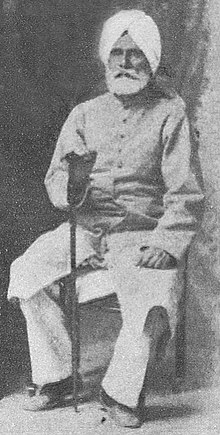Maulana Altaf Hussain Hali (1837-1914) was an Urdu poet, and Writer. Hali occupies a special position in the history of Urdu literature. Though he may not be as great a poet as Ghalib, Momin or Mir Taqi Mir, he was more versatile than all of them. He was a poet, a critic, a teacher, a reformer and an impressive prose-writer. He was a close friend of Sir Syed Ahmad Khan.
Born in Panipat in 1837, circumstances did not permit him to attain formal education in a school or college, yet he had acquired, through sustained self-effort, a perfect command of Urdu, Persian and Arabic, and a good working knowledge of English. Later went away to Delhi where he wished to gain further education in the Islamic theology and poetic tradition. As a poet he did not confine himself within the narrow bounds of the ghazal, but successfully exploited the other poetic forms such as the nazm, the rubai, and the elegy. More particularly, he harnessed his poetic abilities to the higher aims of social and moral edification. Art for him was a handmaid to life. His famous long poem, Musaddas-e-Hali, examines the state of social and moral degradation prevalent in the contemporary Muslim society. His prose treatise, Muqaddama-e-Shair-o-Shairi, is a pioneering work of literary criticism. It dwells on the limitations of the traditional ghazal, and points to the hollowness of its hackneyed themes and imagery, especially when the form is handled by inferior poets and versifiers.
After this turning point in his life, he drifted from job to job for several years, arriving eventually in Lahore in the mid 1870s, where he began to compose his epic poem at the request of Sir Syed Ahmad Khan, the Musaddas e-Madd o-Jazr e-Islam ("An elegiac poem on the Ebb and Tide of Islam") under the new poetic pseudonym of Hali ("The Contemporary"). The Musaddas, or Musaddas-e-Hali, as it is often known, was published in 1879 to critical acclaim, and considered to herald the modern age of Urdu poetry. Hali also wrote one of the earliest works of literary criticism in Urdu, Muqaddamah-i Shay'r-o-Sha'iri.
Musaddas e mado jazr islam, one of Hali's most famous works describes the rise and fall of the Islamic empire in the sub-continent. It speaks about the Islamic empire and its best and worst. The aim of this writing was to forewarn the Muslims of the sub-continent and make them more aware of their past and help them learn from their forefathers' mistakes.
He has also written memorable biographies of Ghalib, Saadi Shirazi, and Sir Syed Ahmed Khan, entitled respectively, Yaadgar-e-Ghalib, Hayat-e-Saadi, and Hayat-e-Javad. His poem "Barkha Rut," describes the beauties of nature in the rainy season; "Hub-e-Watan," underscores the virtues of patriotism; while "Bewa ki Manajaat" focuses on the plight of widows in Indian society. Hali's interests were wide-ranging, and his literary abilities were commensurate with his humanitarian aims.
Maulana Altaf Hussain Hali
Maulana Altaf Hussain Hali
Maulana Altaf Hussain Hali
Maulana Altaf Hussain Hali
Maulana Altaf Hussain Hali
Maulana Altaf Hussain Hali
Maulana Altaf Hussain Hali
Maulana Altaf Hussain Hali
Woh Nabiyon mein rehmat laqab panay wala..
Toheed (11/14) - Pakistani Islamic movie from








No comments:
Post a Comment